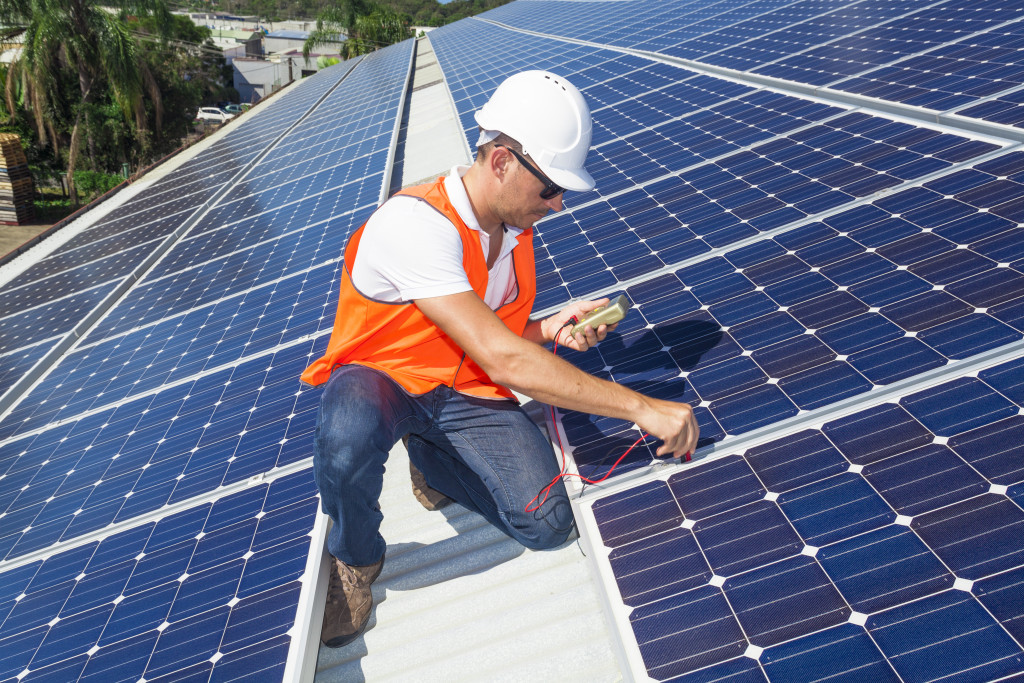Businesses play a significant role in people’s everyday lives. People rely on companies for goods and services, and in turn, businesses rely on people to keep them running. It’s a symbiotic relationship that can be mutually beneficial, but it can also be fraught with tension. However, businesses don’t have the same relationship with the environment.
Many companies in the United States are damaging the environment. According to the EPA, businesses in the United States emit millions of metric tons of carbon dioxide every year. They account for at least 24% of all emissions in the country. That’s a lot of carbon emissions.
As responsible business owners, it is our duty to try and minimize our carbon footprint. There are many ways to do this, like switching to solar power, which has become increasingly popular.
Solar Power
Solar power is harnessed by using solar panels, which are large glass structures that contain photovoltaic cells. These cells convert sunlight into electricity, used in many different capacities.
Many businesses have already switched to this environmentally friendly energy source, including Apple and Tesla. While it does require a significant upfront investment, many companies see the long-term benefits of switching over to this type of energy for their business.
There are various benefits of having solar power, one of which is that it’s cheap.
It’s Cheap
Solar power has a low, fixed cost in the long term, leading to significant savings for businesses.
Solar panels are also environmentally friendly, as they don’t use fossil fuels or produce carbon emissions. They are constantly recycling energy and do not require any extra resources.
Another advantage of solar power is that it’s easy to set up.
Easy to Setup
Unlike other forms of energy, solar panels do not require complicated installations. Instead, a business can hire a professional to set up the panels, and they are good to go.
Having an easier time setting up means that businesses can save money on installation costs and start enjoying their new sustainable energy source.
Solar powers have a faster ROI than other forms of renewable energy.
Faster ROI
The return on investment (ROI) for solar power is usually quicker than for other renewable energy sources. This is because the initial investment is often lower than other options.
Lastly, solar power is far more reliable than other forms of renewable energy.
Reliable
Solar panels are incredibly reliable, as they do not require any moving parts or chemicals. The reliability of solar panels means that there is very little maintenance required, which can save businesses time and money.
They are also built to last, with most panels having a lifespan of 25 years or more. This makes them a great long-term investment for businesses that want to switch to sustainable energy sources.
Despite these benefits, there are still disadvantages to solar power.
What Are the Disadvantages of Solar Power?

Solar power does have some disadvantages that businesses should be aware of before making the switch.
Expensive at first
As mentioned before, solar panels require a significant upfront investment. This can be a deterrent for many businesses, especially small businesses.
Solar Power Not Available at Night
Solar power is only available during the daytime, which means that businesses will still need to have another source of energy for nighttime use. This can often lead to higher energy bills as businesses will have to pay for two different energy sources.
Unreliable in Certain Weather Conditions
Solar panels are not able to generate electricity in cloudy or rainy weather. This can be a problem for businesses located in areas with unpredictable weather conditions.
Requires more space
Solar panels also require a lot of space, which can often be an issue for businesses with limited outdoor space.
Despite these disadvantages, solar power is still an excellent option for businesses that want to switch to renewable energy. So what do you need to make the transition?
Requirements for Solar Energy
There are a couple of requirements before you make the transition. First of which is to get your energy consumption checked.
Get Inspected
You will need to have your energy consumption checked by a professional. This will help you determine how much solar power you need to run your business effectively. Many energy management solutions can help you out with this. They can inspect your company’s energy consumption and even suggest other options for you.
Find a Professional Installer
You will also need to find a professional installer for your solar panels. This is important as it ensures that the panels are installed correctly and can produce enough energy for your business needs.
After following these steps, it’s easy to see why many businesses are switching over to solar power today. While there may be some initial expenses and setbacks, the long-term benefits of this sustainable form of energy make it well worth the transition!

